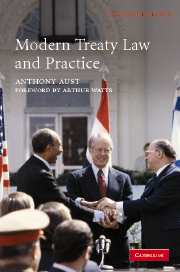Book contents
- Frontmatter
- Contents
- Foreword to the first edition by Sir Arthur Watts
- Preface to the second edition
- Articles of the Convention cited in the text
- Table of treaties
- Table of MOUs
- Table of cases
- Glossary of legal terms
- List of abbreviations
- Introduction
- 1 Vienna Convention on the Law of Treaties 1969
- 2 What is a treaty?
- 3 MOUs
- 4 Capacity to conclude treaties
- 5 Full powers
- 6 Adoption and authentication
- 7 Consent to be bound
- 8 Reservations
- 9 Entry into force
- 10 Treaties and domestic law
- 11 Territorial application
- 12 Successive treaties
- 13 Interpretation
- 14 Third states
- 15 Amendment
- 16 Duration and termination
- 17 Invalidity
- 18 The depositary
- 19 Registration and publication
- 20 Dispute settlement and remedies
- 21 Succession to treaties
- 22 International Organisations
- 23 Drafting and final clauses
- Appendices
- Index
7 - Consent to be bound
- Frontmatter
- Contents
- Foreword to the first edition by Sir Arthur Watts
- Preface to the second edition
- Articles of the Convention cited in the text
- Table of treaties
- Table of MOUs
- Table of cases
- Glossary of legal terms
- List of abbreviations
- Introduction
- 1 Vienna Convention on the Law of Treaties 1969
- 2 What is a treaty?
- 3 MOUs
- 4 Capacity to conclude treaties
- 5 Full powers
- 6 Adoption and authentication
- 7 Consent to be bound
- 8 Reservations
- 9 Entry into force
- 10 Treaties and domestic law
- 11 Territorial application
- 12 Successive treaties
- 13 Interpretation
- 14 Third states
- 15 Amendment
- 16 Duration and termination
- 17 Invalidity
- 18 The depositary
- 19 Registration and publication
- 20 Dispute settlement and remedies
- 21 Succession to treaties
- 22 International Organisations
- 23 Drafting and final clauses
- Appendices
- Index
Summary
and here is the paper which bears his name upon it as well as mine.
The term ‘contracting state’ describes a state which has consented to be bound by a treaty, even though it may not yet have entered into force (Article 2(1)(f)). A ‘party’ is a state which has consented to be bound by a treaty and for which the treaty is in force (Article 2(1)(g)). At that point – and only then – is the state bound by the treaty (Article 26), although certain procedural-type provisions will be operative even before. To consent to be bound is therefore the most significant, positive act which a state can take in relation to any treaty. This chapter explains the various means by which consent can be expressed. The next chapter deals with entry into force. However, as will be explained, although two quite distinct steps are necessary to become a party – express consent to be bound by the treaty and its entry into force – someimes they can take place at the same time.
Participation in a treaty
In Chapter 4 we saw which entities can be parties to treaties, but this does not mean that the main entity, a state, can be a party to any treaty. This should be clear in the case of bilateral treaties. But whether a state (or another subject of international law, such as an international organisation) can participate in a multilateral treaty depends entirely on the terms of the treaty.
- Type
- Chapter
- Information
- Modern Treaty Law and Practice , pp. 94 - 124Publisher: Cambridge University PressPrint publication year: 2007



